Jennifer Freitag's Blog, page 46
August 13, 2011
Day Thirteen {Concerning Writing}
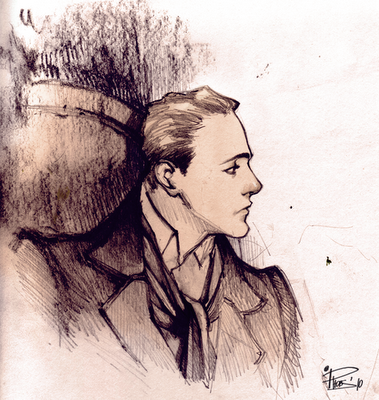 "There is a strange idea abroad that in every subject the ancient books should be read only by the professionals, and that the amateur should content himself with the modern books. Thus I have found as a tutor in English Literature that if the average student wants to find out something about Platonism, the very last thing he thinks of doing is to take a translation of Plato off the library shelf and read the Symposium. He would rather read some dreary modern book ten times as long, all about 'isms' and influences, and only once in twelve pages telling him what Plato actually said."
"There is a strange idea abroad that in every subject the ancient books should be read only by the professionals, and that the amateur should content himself with the modern books. Thus I have found as a tutor in English Literature that if the average student wants to find out something about Platonism, the very last thing he thinks of doing is to take a translation of Plato off the library shelf and read the Symposium. He would rather read some dreary modern book ten times as long, all about 'isms' and influences, and only once in twelve pages telling him what Plato actually said."day thirteen: your favourite book about writing
Thus C.S. Lewis introduces Athanasius' On the Incarnation, and, while I am not an English Literature tutor by any means, I am inclined to say he is right. I went through a literature class, and you would be surprised how very little literature was to be found in those literature text books. It is all about the style and the form and the reason behind the writing. Rubbish. You might as well go through the detailed biological makeup of your wife to tell someone that she is pretty. You cannot kill the goose if you want to have more golden eggs.
Number one, has it ever occurred to those literature teachers that any book may have been written for the sole purpose of creating a good story? Number two, writing is the sort of skill that must be taught by practice chiefly, and by study additionally. You can read volumes on the history and build of a gun, but until you get out in the firing range and wield the thing you will not know how to use it.
As regards writing, I went out and did what Lewis suggested - though I can take little credit as I had no idea his suggestion existed at the time, nor did I realize quite what I was doing. I went out and read. I had no books about writing (and they would have been dull as dullness anyway if I had) I merely had tomes of good writing to hand. So I read them. Just as a worker in a minting factory can pick out fakes or flaws at a glance having studied the real thing, I learned rubbish by acquainting myself with good literature. This is not to say I could write anything other than rubbish: just because you know how a gun goes together and works does not mean you can peg a target in the chest. (I always aim for the head anyway.) I had to work at acclimating myself to the skills I had learned.
I learn by imbibing. I am not the sort of person who can be given a book of bullet points on how to go about writing a decent novel. I won't understand it, and it will only irritate me. I had to immerse myself in decent novels. I had to meet well-written characters to learn how a well-written character works. Writing isn't merely putting words together to make a story, it's knowing which words convey the precise meaning, have the precise impact, and tell precisely what you want. It's an art. It's an art of language. And, like any language, the best way to learn it was to go listen to people who spoke it. I learned the potent play of words in passages like
"I only want my rights. I'm not asking for anybody's bleeding charity."
"Then do. At once. Ask for the Bleeding Charity."
and the way natural beauty can be portrayed through figures on ink with such power in passages like
Astern, great clouds bridged the gates of day, boiling upwards into crags of wine-dark vapour and burning plumes of sunrise. In the stainless spaces of the sky above these sailed the horned moon, frail and wan as a white foam-flower blown from the waves. Westward, facing the thunder-smoke of dawn, the fine far ridge of Kartadza was like cut crystal against the sky: the first island sentinel of many-mountained Demonland, his top-most cliffs dawn-illumined with pale gold and amethyst while yet the lesser heights lay obscure, lapped in the folds of night.
I never had a book to teach me how to write; my books were my teachers. There is something to be said for natural raw talent, of course, and I think I had that: but more than that my tutors were masters of the craft already: I was their apprentice.
I rather hope to do them proud.
Published on August 13, 2011 05:05
August 12, 2011
Day Twelve {Song}
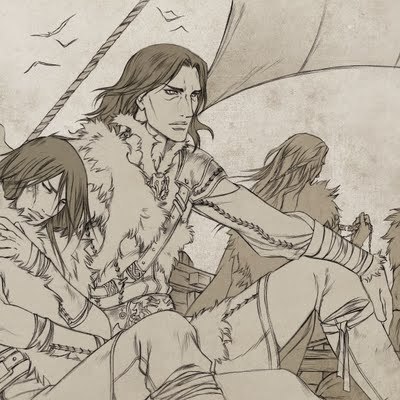 The frontiers between sense and spirit are the Devil's hunting-grounds.
The frontiers between sense and spirit are the Devil's hunting-grounds.Coventry Patmore
I am put at something of a disadvantage by reason of my own personality regarding today's topic. However I may come across to people in general, I simply don't listen to a great many songs, though I listen to songs frequently. I am a determined creature of habit and refresh my collection very infrequently.
day twelve: a song about books or writing
So, you see, this puts me at a disadvantage. I don't know if I know any songs about books or writing. Perhaps I do and they merely escape me, but I can fudge the question and say that I know books that are song - or, rather, a sort of poetry, which was much the same thing long ago. And I am very much a person of long ago. So, if you don't mind, indulge me, and I will dig up books that are song (or poetry), and perhaps a strain or two that particularly impacts my books and my writing.
Beowulf
You weren't getting off without it. I have two or three translations of it, each with its own introduction and explanation of the poetry I am about to read. My favourite by virtue of longer acquaintance is Burton Raffel's copy; in the explanations, he not only talks about Beowulf as a poem, but Scandinavian poetry as a whole, about the importance of it, about the skill which men had in making it which we have now completely lost.
...And sometimes a proud old soldier
Who had heard songs of the ancient heroes
And could sing them all through, story after story,
Would weave a net of words for Beowulf's
Victory, tying the knot of his verses
Smoothly, swiftly, into place with a poet's
Quick skill, singing his new song aloud
While he shaped it, and the old songs as well...
Beowulf is nothing short of magnificent, and please remember that I am nothing but an uneducated lunatic: the poem really does contain all this beauty for the average reader. It is splendid, it is sad, it is powerful, it is hopeful, it is good. There is in it not only the strength of a people who, like Innocent Smith, were alive on their own two legs - there is also a profound understanding of and faith in God. Beowulf does not contain, as you might suspect, a kind of simple, primeval faith. The creeds contained, while not the main thrust of the poem, are nevertheless potent, steadfast, God-fearing, and perhaps in their mingled grimness and hope rather better than what we cultivate today.
Something Told the Wild Geese
Rachel Field
Something told the wild geese
It was time to go.
Though the fields lay golden
Something whispered - "Snow."
Leaves were green and stirring,
Berries, luster-glossed,
But beneath warm feathers
Something cautioned - "Frost."
All the sagging orchards
Steamed with amber spice,
But each breast stiffened
At remembered ice.
Something told the wild geese
It was time to fly -
Summer sun was on their wings,
Winter in their cry.
We Who Were Born
We who were born in country places
Far from cities and shifting faces,
We have a birthright no man can sell,
And a secret joy no man can tell.
For we are kindred to lordly things:
The wild duck's flight and the white owl's wings,
The pike and salmon, the bull and the horse,
The curlew's cry and the smell of gorse.
Pride of trees, swiftness of streams,
Magic of frost have shaped our dreams.
No baser vision their spirit fills
Who walk by right on the naked hills.
The two poems above, stumbled across in my youth, have continued to haunt me with their wild beauty. I have always ached at the sound of the geese overhead, and never known why; I have always ached at pastoral scenes, and never known why. I conjure up some childhood images of walking down the unpaved lane of my grandmother's house in the cool of an autumn morning, with the cornfields and the woods full of mists and sunlight and shadow and the yelp of a fox-kit, and there is something Janus-like in the notion. Those were happy days of childhood, and childhood is gone. But everything, the aching after the geese, the somehow distant-seeming image of the fields, seem to be straining ahead for something. I'm waiting for the geese to come home for good, and for the fields to be sunlit forever.
Sea Fever
John Masefield
I must go down to the seas again, to the lonely sea and the sky,
And all I ask is a tall ship and a star to steer her by,
And the wheel's kick and the wind's song and the white sail's shaking,
And a gray mist on the sea's face, and a grey dawn breaking.
I must go down to the seas again, for the call of the running tide
Is a wild call and a clear call that may not be denied;
And all I ask is a windy day with the white clouds flying,
And the flung spray and the blown spume, and the sea-gulls crying.
I must go down to the seas again, to the vagrant gypsy life,
To the gull's way and the whale's way, where the wind's like a whetted knife;
And all I ask is a merry yarn from a laughing fellow-rover,
And quiet sleep and a sweet dream when the long trick's over.
This poem is a favourite of Abigail's and mine. It, too, aches as the sound of the geese overhead aches. But it is a nomadic sort of aching, a longing to be off looking for something: the Viking-longing to follow the whale-road, very likely, though I throw myself farther back than "a tall ship" when I say so. But it is not at all difficult for me to imagine that grey dawn in which the wind is suddenly blowing fitfully from the south-east and there is no warmth but a promise of warmth in the air, and spring is coming and the gulls are flying, and you know in your heart it is the viking season once more, and to run away the sea-spray under your prow.
John Milton
Is it true, O Christ in Heaven, that the highest suffer most?
That the strongest wander furthest and most hopelessly are lost?
That the mark of rank in nature is capacity for pain?
That the anguish of the singer makes the sweetness of the strain?
I suppose it is rather evident that I like a kind of bitter-sweetness in my songs and poetry, and no doubt there is a kind of bitter-sweetness to be found, consequently, in my writing. And perhaps that is as it should be.
Published on August 12, 2011 04:50
August 11, 2011
A Chill Runs Through Her Veins
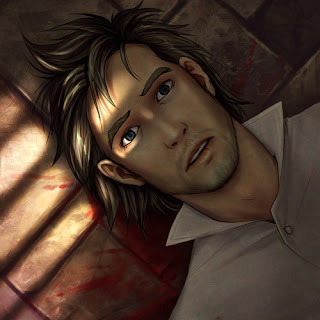 In my post "I Aim To Misbehave," I dealt with how to go about writing violence, because violence often crops up in stories. We have to have conflict of some sort, or everything is too unrealistic and too boring. I dealt largely with the idea of a fight and how characters might react to or handle a fight. My post was, of course, not at all exhaustive, but I hope it engendered pensive attitudes regarding the problem. But there is another aspect to fights and violence in literature which, when touched on, makes the scene even more realistic.
In my post "I Aim To Misbehave," I dealt with how to go about writing violence, because violence often crops up in stories. We have to have conflict of some sort, or everything is too unrealistic and too boring. I dealt largely with the idea of a fight and how characters might react to or handle a fight. My post was, of course, not at all exhaustive, but I hope it engendered pensive attitudes regarding the problem. But there is another aspect to fights and violence in literature which, when touched on, makes the scene even more realistic.In writing Adamantine, which has a young woman as its main character, I was taught something about physical conflict. Not only does it have to be sensible, it has to be felt. Could she watch someone have his guts dumped out and not feel horrified by the carnage? Could she bring herself to inflict damage on someone else, even for self-preservation, or would the horror of pain in the human body be too much for her? She is a young, sheltered Victorian lady. Her butchered meat, the closest she ever gets to carnage, is brought up to her kitchen door and handed to the cook to prepare. Violent death leaves her in a state of shock and hysteria. Even for the sake of a smooth narrative, I can't simply ignore the fact that violence, and violence that leads to death, is horrifying. It's a psychopath, a twisted villain, and a seasoned, loyal warrior who can kill and not feel that horror - or even feel a sense of delight in killing. My young woman is none of those.
Circumstance and your own temperament will determine how you go about addressing this subject, but I think it ought to be addressed. Just as you can't have a character who has never learned martial arts proceed to employ distinctly oriental methods of combat, so you can't have someone who has never seen blood a day in his or her life witness a great and violent deal of it without emotional repercussions. I do not advise angst as angst has come to be known today, particularly among the teenage population. It need not be crippling, it need not be lasting: but it is very unrealistic for an otherwise innocent character to inflict or to see pain or death inflicted on another without feeling the backlash of it.
The body broke her fall. Sissel was there somewhere, crouched with her, trying to drag her away. She was dimly aware of flame and heat. The only two things she as sharply conscious of was the looming presence of the dragoon soldier and the cold metal of the dead man's pistol under her hand. Don't think, she told herself. Just do it.
The man grabbed her shoulder and jerked her round. With a desperate sob she raised the pistol, breaking the man's nose on impact. She shut her eyes, and pulled the trigger.
There was a bang and a wet explosion on her own face. Beyond her closed eyelids she saw the flash of fire from the hammer. Almost at once she dropped the weapon, afraid of it, dragging her eyes open against the running spray of blood to see the body crumpled almost in her lap, its face blown out of recognition.
I say it need not be crippling, but sometimes it is. As an idle scribble I was writing two characters, a father and his daughter. They both proved to be difficult characters to write, but enjoyable. However, when the daughter was kidnapped according to the little plot I had in mind, I could no longer write the father. There was nothing sensible to write. The rage, the terror, the passion of a father whose little girl has been lost - how could I write that? I am not yet sure, but what else could I do? It would be ludicrous for the father to take the kidnapping of his child with a level head. I had to reduce the story to this passionate rage or everything would be shallow and cheap.
...feathers were everywhere, little soft ivory-coloured peels all over the bed and floor. The sight was a jolt to Rede's stomach. He dropped to one knee and felt under the bed: there was nothing there but dust and more feathers. But when he got back up the wall at the head of the bed fell under his gaze and the panic gripped him again, crawling up from his belly.
The plaster was shattered in raking grooves and the timber support beams were notched to the white. Blood, like a macabre celestial painting, splattered and streaked the wall. It was then that he realized the blood was everywhere, beginning to smell with the rising warmth: it stained his knee where he had knelt on the floor and drenched the rugs and limp piles of feathers. In mingled horror he drew back, forcing Red Branch's name through his locked jaw.
Food for thought! Keep in mind not only the physical sensibleness of a fight, but the emotional aspects as well. (Megan, you are exempt from these admonitions because you are so painfully a master at it already.) Sometimes to be realistic and poignant, we have to scribble outside our comfort zones, and perhaps this is one area where that is true. Keep in mind a girl's shock at seeing a cat kill a bird, and a conniving queen's delight in administering poison. Keep in mind a boy's terror of his first full-pitched battle and the callous enjoyment of a serial killer. The reader shares the horror with the one, and feels horror at the other. Again, circumstances and your own temperament will determine how you attack these issues, but attack them you must. And have fun!
Published on August 11, 2011 07:54
Day Eleven {Female Author}
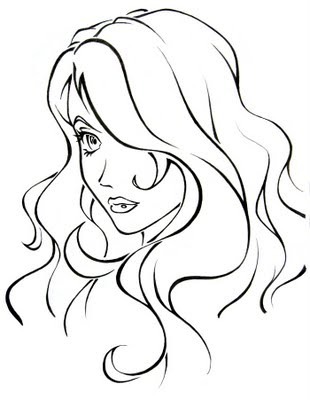 For a mildly vague answer to today's question, the reader might want to take a gander at day four's post. I will endeavour to the best of my ability to not be redundant.
For a mildly vague answer to today's question, the reader might want to take a gander at day four's post. I will endeavour to the best of my ability to not be redundant.day eleven: your favourite female author
It has to be said upfront that I try not to learn too much about the authors whose works I read. Being an author myself, I know that there is a difference between the person who wrote the book and the book itself. Also, knowing the author somewhat cheapens (for me) the life of the work itself. I don't particularly want to know that someone wrote the book, I want the story to be real in its own right. A horse book I read years ago regarding the art of teaching Lipizanners how to dance perhaps sums up the idea best.
Hans examined the picture carefully, slowly. He studied the angle of the leap, the position of the haunches, the hocks, the bend of the foreleg, the arch of the neck. Then he looked at the rider. The face did not show. It might have been himself, or anyone he knew, or no one. The rider had somehow extinguished himself in order to glorify the horse, to make him look as if he had performed of his own will - joyously, gaily.
As a writing aside, I think that is the aim of an author: to extinguish himself and bring forward as if to life his own creation, as if the story were alive in its own right. So, you see, this is a difficult question for me to answer, perhaps more difficult regarding my favourite female author because she wrote more fiction than my favourite male author.
Rosemary Sutcliff
There is no E on the end. I met her, after a fashion, when I was young. I met her in my bedroom, sitting on the bottom bunk (which was Abigail's) - and I met her along an old timber track that struck out fairly into Devon-country. As it were Scrooge and his accompanying Ghosts we watched the comings and goings on that road, and listened to the drovers and hawkers and the tramp-tramp-tramp of the Auxiliaries' feet in perfect regimental time. She knew how to weave a story! She knew the little heart-close details that wake up history and make it alive again. She showed me that golden-fine Cohort of Gaulish Auxiliaries, she showed me the old-world splendour of a British chariot in full career; she showed me a docile Roman household with a light British rain in the fruit trees; she showed me (still further from my tame world) the untouched ruddy glory of the Caledones beyond the pale of Rome. She knew how to weave a story. She could feel the rightness of things, the liveliness of things, how slender and important a thread that life hung on. I know she had her help from many authors who came before her (I have had the opportunity to meet some of those too), but she is still special to me. She taught me how to write the rightness of things and the elemental throb of things, to learn how to wake up history to life again. There are many good authors out there, some of them women like myself. But Rosemary Sutcliff will always be special to me.
what I have read
The Eagle of the Ninth
The Silver Branch
Frontier Wolf
The Lantern Bearers
Dawn Wind
The Shield Ring
Outcast
The Capricorn Bracelet
Warrior Scarlet
Sun Horse, Moon Horse
The Mark of the Horse Lord
The Shining Company
Heather, Oak, and Olive
Simon
Flame-Coloured Taffeta
Published on August 11, 2011 06:13
August 10, 2011
Day Ten {Good Book}
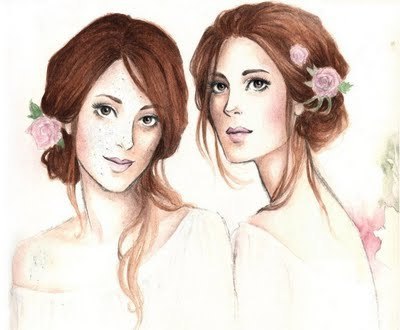 "There is no mistaking a good book when one meets it.
"There is no mistaking a good book when one meets it.It is like falling in love."
Christopher Morley
This quotation, nicked from Liz's blog Awake, seemed rather applicable to today's subject, though perhaps from the other end of things. But perhaps not. The quotation does not limit itself to mere reading, though it is likely that Mr. Morley meant it so. But if you like to have an open mind, mightn't the quotation apply to writing a book just as much as it applies to reading one?
day ten: your answer to "what is the most important thing one should know about writing a book"
This is an enormously difficult question to answer. It assumes I know something about writing. It assumes I know something important enough to tell other people. It assumes I'm smart enough to be heard. Well, let's assume; and, while we are assuming, "take comfort in our smallness," as Malacandra said.
My answer would be two-fold, and Elspeth already gave half of it away. It isn't any great loss. It's an old answer to an old question.
read good books
If you take Mr. Morley's view of things, this ought to be easy. Unfortunately, it isn't. How does one define "a good book"? In general, my answer to the question of how to write a good book is to read books by authors who are now dead. My reason for this is that, in general, a book that is good will stand the test of time. Silly books, shallow books, fade away with time, and the well-written works, the strong ones, the enduring ones, are with us today after their authors have become cold in their graves. But is this a sufficient answer? Silly books slip through the guard and keep flapping their pages after their authors die. Good books fade into oblivion and are found later, battered and forlorn, in the back corner at the bottom of the biggest stack in some dog-hole of a second-hand bookstore. So the answer isn't sufficient.
Perhaps it would be better to admonish the readership (or the writership) to pick up books that are true. The history: is it accurate? The fantasy: is it morally sound? The fiction: does it well depict man's fallen nature, and his hope for betterment - death and darkness and vengeance, life and light and mercy as well? The philosophy: is it according to that of the time and people and country? Whatever the subject, is it handled truthfully? This is not to say that all books one reads need be biblically true, only that they must be true to the topic handled.
Again, it is a most difficult question to answer. But once you understand the true nature of things (having read books that deal with this) it is much easier to write about them. You know them.
put your pen to paper
Already too many people have told me, "Oh yes, I want to write a book someday too." This sentence is so riddled with fallacy that I hardly know where to begin addressing it. It would be best to establish writing as, not a pastime, but an art. (I speak of writing novels, not of articles, though the writing of news articles ought to be considered an art too.) One cannot merely sit down one day and "write a book." We did that when we were children once, and the results were atrocious. Writing, like any art, takes time and devotion and seriousness and practice and blood and sweat and toil and tears. You must work at it. When you determine that you want to write a book, you mustn't say "one day." You must sit down at your earliest convenience and begin to practice wordcrafting. Only after scribbles and inkstains will you begin to formulate a skill with words and your own style of writing, and have finally come to a place where you can begin to write that book of yours. You can't sit down at the piano, having never touched the ivories a day in your life, and play a movement from Beethoven on a whim - no more can you sit down at the keyboard, having never written a piece of prose in your life, and churn out Ben-Hur. (It is, of course, intuitively obvious that this is impossible because Ben-Hur already has an author.)
If you want to write a book, then write the dashed thing. Don't Emma Woodhouse and try your hand at so many things that you do justice to none of them. Art itself - real, proper, truthful art with blood and sweat and toil and tears mixed into it - deserves respect: writing is no exception.
Published on August 10, 2011 11:40
August 9, 2011
Day Nine {Current Project}
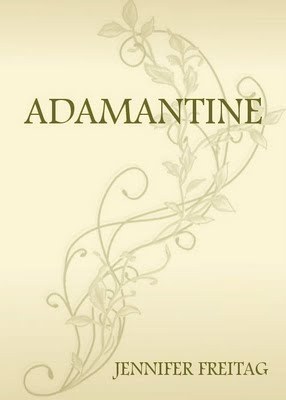 day nine: what is your current writing project
day nine: what is your current writing projectI have to laugh at this topic. I am sure you must already know what I am up to. At this very moment I have my USB drive plugged in, my document open, my massy bulk of printed manuscript sprawled at my side for reference, ready to begin this morning's session of editing-work. Oh, and, of course, I have my tea.
My current project, slogging through the editing stage, is the fantasy novel Adamantine, weighing in at the moment around 218,080 words. Being so very much bigger than The Shadow Things (which is 192 pages) she has given me a great deal more grief than my first novel, but, in a sense because of that, she has been that much more rewarding.
What is Adamantine? Well, I have a page about it, and I don't want to be redundant (it grates on people's nerves, don't you know?), but in summary I will say that it is a kind of sequel to Beowulf. There was not enough of the legendary heroes in the Old Poem to quench my thirst, so, as it is said, if there is a book you want to read and it hasn't been written yet, you have to write it. So I did. Beowulf was dead, but Wiglaf his heir wasn't - Wiglaf, who was bravery and loyalty itself. I wanted to know about him. But first there were fairies, and their empire which they had made; and there were savage cat-like barbarians living on the unenlightened outskirts of that empire; and there was Victorian England, and a young well-to-do orphan girl with some pluck and naivete. Things which did not seem to go together were being pulled together as I wrote and wrote and wrote; it seemed more as if I were merely following the single incongruous threads as they drew closer and closer together, as I grew closer and closer to the hand that was pulling them into a single cord.
the road now leads onward as far as can be
winding lanes and hedgerows in threes
by purple mountains and round every bend
all roads lead to you: there's no journey's end
Inevitably I will be asked how long it took me to write Adamantine. The simple truth is that I don't know. You might as well as me what time I fell asleep: how am I supposed to know? I didn't keep track of the time and day when I sat down to write the opening scenes of a drab rainy day and a drab rainy fairy. I had no clear idea where I was going back then, nor what might come around the bend of the next chapter. All I knew was that something was unfolding in those deep dark secret places, and I had to get it down on paper. It has come a good long way since those early days (it has not been an easy way, either) and it has a distance to go yet. But it has been very rewarding. Despite the inevitable ups and downs and garbagey passages that had to be ripped out and ditched and rewritten, despite the despair and heartache, despite not knowing where to go next, I can sit back and look at the under-construction bulk of Adamantine and feel pride and excitement chasing each other widdershins inside of me.
But they can usually be quenched with a good dash of editing.
Published on August 09, 2011 04:35
August 8, 2011
And Still His Name Sounds Stirring
I wrote a while back about the little details a writer uses to introduce a reader to a character. Just the other day I had the opportunity to be introduced to a rather splendid character, full of those little details which more or less summarized my sentiments. I say all this with aplomb, but don't let that fool you: I was taken with this fellow the moment he stepped into the room.
Lord Brandoch Daha
...leaning forward Lessingham saw where the arras curtains behind the dais parted for a moment, and one of princely bearing advanced past the high seats down the body of the hall. His gait was delicate, as of some lithe beast of prey newly wakened out of slumber, and he greeted with lazy grace the many friends who hailed his entrance. Very tall was that lord, and slender of build, like a girl. His tunic was of silk coloured like the wild rose, and embroidered in gold with representations of flowers and thunderbolts. Jewels glittered on his left hand and on the golden bracelets of his arms, and on the fillet twined among the golden curls of his hair, set with plumes of the king-bird of Paradise. His horns were dyed with saffron and inlaid with filigree work of gold. His buskins were laced with gold, and from his belt hung a sword, narrow of blade and keen, the hilt rough with beryls and black diamonds. Strangely light and delicate was his frame and seeming, yet with a sense of slumbering power beneath as the delicate peak of a snow mountain seen afar in the low red rays of morning. His face was beautiful to look upon, and softly coloured like a girl's, and his expression one of gentle melancholy, mixed with some disdain; but fiery glints awoke at intervals in his eyes, and the lines of swift determination hovered round the mouth below his curled moustachios.
The Worm Ouroboros, E.R. Eddison
Isn't the paradox delicious? He's like a stallion, all pretty and prancing and faintly mocking, but just you catch him in a fight, or fresh from the gate, and he'll trounce you in a heartbeat. The writing was so beautiful, I had to share.

Lord Brandoch Daha
...leaning forward Lessingham saw where the arras curtains behind the dais parted for a moment, and one of princely bearing advanced past the high seats down the body of the hall. His gait was delicate, as of some lithe beast of prey newly wakened out of slumber, and he greeted with lazy grace the many friends who hailed his entrance. Very tall was that lord, and slender of build, like a girl. His tunic was of silk coloured like the wild rose, and embroidered in gold with representations of flowers and thunderbolts. Jewels glittered on his left hand and on the golden bracelets of his arms, and on the fillet twined among the golden curls of his hair, set with plumes of the king-bird of Paradise. His horns were dyed with saffron and inlaid with filigree work of gold. His buskins were laced with gold, and from his belt hung a sword, narrow of blade and keen, the hilt rough with beryls and black diamonds. Strangely light and delicate was his frame and seeming, yet with a sense of slumbering power beneath as the delicate peak of a snow mountain seen afar in the low red rays of morning. His face was beautiful to look upon, and softly coloured like a girl's, and his expression one of gentle melancholy, mixed with some disdain; but fiery glints awoke at intervals in his eyes, and the lines of swift determination hovered round the mouth below his curled moustachios.
The Worm Ouroboros, E.R. Eddison
Isn't the paradox delicious? He's like a stallion, all pretty and prancing and faintly mocking, but just you catch him in a fight, or fresh from the gate, and he'll trounce you in a heartbeat. The writing was so beautiful, I had to share.
Published on August 08, 2011 07:43
Day Eight {Genre}
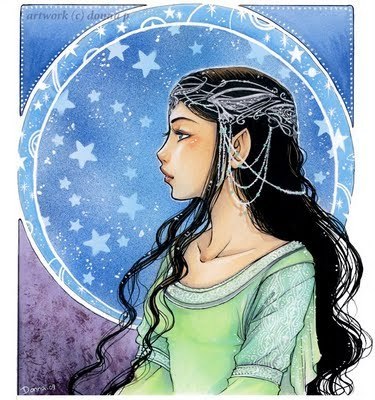 Mm...cheatin'. Day Eight really concerns a video about books or writing, but I don't tend to watch videos (I assume they mean something off YouTube, and that sort of thing), and I missed Sunday's session of Lerowen's writing challenge because, first, I don't usually get online on Sundays, and, second, because my server took the Lord's Day off too. So I am writing on the seventh day's topic on the eighth.
Mm...cheatin'. Day Eight really concerns a video about books or writing, but I don't tend to watch videos (I assume they mean something off YouTube, and that sort of thing), and I missed Sunday's session of Lerowen's writing challenge because, first, I don't usually get online on Sundays, and, second, because my server took the Lord's Day off too. So I am writing on the seventh day's topic on the eighth.day eight: your favourite genre to write
Well, Anna said it best. It is my turn to mooch from her intellect. I'm not really big on that kind of fantasy genre which is so divorced from reality as to be unrecognizable: fantasies with impossible-to-pronounce names and man-eating bogs, creatures that take pages to describe because they are so unique...that sort of thing. But I love the fantastical. I love the magical. I love that kind of literature which takes the reader back of everything in this world to the splendour it really bears (or should bear). I love stories that, despite their fantastic trappings, catch you unawares between idle thought taking it for granted that they are real. Beowulf - monsters spawned from Cain and ancient dragons? And yet, something about the old Scandinavian tale is real. Beowulf is real. The struggle against dragons (G.K. Chesterton, anyone?) is real. And somehow everything else filters in as real too. When you read The Hobbit, that English frankness (which did not come until the Norman invasion) makes everything seem real.
I like writing this mild sort of fantasy. It really depends on what I am trying to say. Sometimes it takes a very strong sort of magic to get through the murk and crusted darkness of an otherwise dull-seeming world to that sleeping shifting bit beneath that can remember Eden. It hasn't forgotten. It is almost painfully conscious that it is lost, and of what it lost - but also that it is being found again. I like catching those strains: it is an eerie music, isn't it? To the dull and common sense, it seems like so much fiction. But there are dreams and there are dreams, and it is a piece of truth that there is, or was, or will be, a newness of life in everything: in our step, in our sunrises and sunsets, in our heroes, in our stories. That is what I like catching.
"Man, like Janus, looks forward and backward, with longing and confusion, to a Golden Age that is so far removed he cannot remember if he merely dreamt it, or if he walked it waking once. It is still there: marred as man is marred, besmirched and fallen as man is besmirched and fallen (what great worlds fell when man took his willful plunge!), but it is still there. There is warmth in a glass of wine and silver lining on the storm-wrack, and a sense of renewal and joy in spring—which harkens to our final Sabbath—which God has been pleased to bless us with, so that man in all his futility might taste and be accountable for His mercy, and so that man, longing for the Sabbath, might not grow over-weary."
from dreams of sleep shall men awake
one day, but not to weep:
the dreams remain; they only break
the mirror of the sleep
Published on August 08, 2011 04:40
August 6, 2011
What Art Thou, Idle Ceremony

Art thou aught else but place, degree and form,
Creating awe and fear in other men?
I realize that, in all technicality, it is day six of Lerowen's writer challenge, but, like Anna, I don't have a bucket list, nor even something bucket-listy that has to do with writing. I alternate between the notion of taking each story as it comes and the knowledge that there is not enough time in a single life to write down all the stories I could come up with. And...I simply don't do bucket lists.
So! - it's my Liebster Blog award! Abigail gave it to me, and I'm all very peached about it, even though I think she is totally biased. But this is one of those awards that has strings attached: it has rules. "The goal of the award is to spotlight up and coming bloggers who currently have less than 200 followers." The rules run as follows:
1. Thank the giver and link back to the blogger who gave it to you.
2. Reveal your top 5 picks and let them know by leaving a comment on their blog.
3. Copy and paste the award on your blog.
4. Have faith that your followers will spread the love to other bloggers.
5. And most of all - have fun!
There are disadvantages to having a twin sister five years younger than yourself. We run in almost the exact same circles, and Abigail took most of my blog choices. Well! I'll just have to yoink blogs from elseplace.
1. Awake - Awake is a gorgeous blog, full of the thoughts of a young woman on her faith, on her life, on the world, on writing - on living awake. Liz Patterson is the author of The Mark of the Star, and you can read about its growth and realization there on her blog...also, you can buy it!
2. A Spirit Not of Fear - If you want a blog full of the ecstasy of life in Christ, this is the blog to go to. Written by a young woman looking ever toward her Home, conscious of the transience of this life, always going further up and further in, this blog is beautiful almost to the point of heart-breaking.
3. A Celtic Cowgirl - Okay, I like horses. I have always liked horses. I have never had the opportunity to have much to do with horses, so I enjoy them by proxy: such as by this intelligent horse-girl's ramblings on her four-legged fellows.
4. Shilah - The beautiful blog of the Shy Girl. She's smart, she's classy, and she's a writer: "And when rains can no longer weep, and the sky can no longer fall down upon me, and the stars are dying embers of their fire, and my heart has lost its way...what would there be left for me but your faith and your God?"
5. Living on Literary Lane - Elizabeth Rose is full of it: of good books, of insights into literature, of pretty music, of photography... Go check out her blog!
Here is to intelligence, to the child-like love of life, to faith in our God. Thank you for blogging!
Published on August 06, 2011 06:01
August 5, 2011
Day Five {Least Favourites}
 I left the kettle open this morning. I was wondering why on earth it was taking such a long time for the water to boil and the kettle to start screaming. Derp.
I left the kettle open this morning. I was wondering why on earth it was taking such a long time for the water to boil and the kettle to start screaming. Derp.day five: your least favourite character you've written
All right, all right, I thought picking out my favourite male author was difficult. And it was. There were a lot of gentlemen to chose from. But on today's topic I suddenly find myself at a loss. I thought about it and thought about it: who is my least favourite character I have ever written? And what does "least favourite" mean? Does it mean, the character I was least satisfied with, or the character who gave me the most trouble, or the character whose personality I dislike the most? And regardless of the specificity of the answer, I haven't been able to find one. This means that I am either extremely vain or adept in avoiding writing those characters I know will irk me. They say the mind forgets pain. It's possible that I am just adroitly avoiding the memory of such characters and that's why I can't think of them. But I have to settle on someone. I must be normal enough to have a character I don't like as much as my others.
Vivian
Lady Vivian, an antagonist in my pending story Not Raymond, has never been easy to write. Not only is she a woman (I find women rather hard to write, myself), she is a rich, ambitious woman. Her story has the potential to be very intriguing, and I really am looking forward to writing it. She is one of those high society persons who move close to royalty - close enough to take aim at a spot near the throne. She has everything she needs: good looks, cunning, drive, and an appalling lack of scruples. Unfortunately, her character has never been one that came easily to me: it is like trying to get a good look at a cockroach by shining a light on it: every time, it slips away. Additionally, antagonistic women are a lot harder for me to write than their male counterparts. The sly, cunning, sinister woman is difficult to get right. Lady Vivian, more than any of my other female antagonists, continues to elude my uneasy, decorous efforts to write her. She simply won't conform. She insists on charging with feminine indelicacy into the plot, down the rabbit-hole, down the hell-hole, and I'm left whimpering, "But I don't wanna..." When it comes to Vivian, like my protagonist, I am crippled by a sense of propriety which, as the writer, I can't afford to have. It's all very vexing.
"Lady Vivian is one to play with fire, and she played with a fire which cast too deep a shadow."
Published on August 05, 2011 05:31



